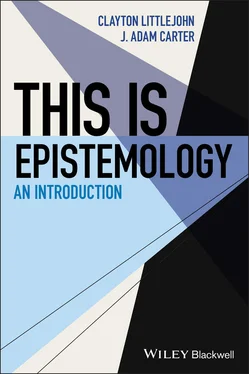1 ...7 8 9 11 12 13 ...28 1.27This might seem like a decent line for the infinitist to press, though it invites a new kind of problem. Consider that to respond to the Argument from Finite Minds the infinitist has had to broaden the class of justifiers to include things that aren't now believed but are nevertheless available in some sense. Perhaps these are things that we would accept or believe and cite in support of our beliefs if challenged or asked for a justification. 19 If this line of reply could be made to work, then it would free the infinitist up to deny that justification requires having more beliefs than we really have.
1.28At this same time, though, if the set of justifiers that would justify the beliefs you hold now could consist not entirely of things that moved you to form the beliefs in the first place, then a new kind of worry surfaces, which is that the infinitist would have no way to distinguish justification from mere rationalization (e.g. citing reasons that weren't your actual reasons, but which you might nonetheless cite if pressed).
1.29One strategy in response to this kind of worry that has been pursued by Peter Klein (2005, pp. 135–136) is to clearly differentiate the infinitist's demands on two distinct kinds of epistemic justification: propositional justification (roughly, the kind of justification you have for a proposition if it would be reasonable for you to believe it) and doxastic justification (roughly, the kind of justification you have for beliefs held on the basis of reasons you're propositionally justified in believing 20 ). For the infinitist, the proposition expressed by B1 (i.e. rental prices will continue to increase in London in the coming year ) is propositionally justified for you just in case there is available to you at least one infinite non‐repeating series of propositions (or reasons) such that R1 is a good reason to believe B1, R2 is a good reason to believe R1, R3 is a good reason to believe R2 … and so on. 21 But to be doxastically justified in believing B1, the mere fact that B1 is propositionally justified for you is not sufficient. A further necessary condition is that you must have appropriately provided, as Turri (2013, p. 792) puts it, “enough reasons along at least one of the infinite non‐repeating series of reasons, in virtue of which [sic. your belief] is propositionally justified for you, to satisfy the contextually determined standards.” Regarding “contextually determined standards”: in short, the idea is that providing several reasons (from the infinite series that is available to you) may suffice for doxastic justification in an epistemically friendly setting, whereas in the context of a hostile interrogation, say, doxastic justification might require that you provide (say) 10 or 35 of them. But you are not required to provide an infinite series of reasons.
1.30By drawing this distinction – in particular, by insisting that infinitist propositional justification is not sufficient for infinitist doxastic justification – the infinitist looks initially to be in a position to sidestep the kind of rationalization worry noted above. After all, once the distinction is drawn in the way Klein draws it, your actually citing certain reasons (from the relevant infinite non‐repeating series) is doing some of the heavy lifting in accounting for your belief's doxastic justification.
1.31However, it's hardly the case that the infinitist is in the clear simply by drawing the distinction noted. To appreciate this point, consider the following two infinite series:
Series 1: R1, R2, R3, R4, R5 …
Series 2: R1, R3, R2, R4, R5 …
Assume that these two series contain the same infinite number of reasons, but in a different order; while there is no reason in Series 1 that does not occur in Series 2, and vice‐versa, Series 1 might suffice to justify your belief while Series 2 does not. (After all, R2 might be a good reason to believe R1, but R3 might not be. 22 )
1.32As Podlaskowski and Smith (2011) have argued, this fact – in short, that “ordering matters” – turns out to be relevant to whether Klein's strategy of response to the Argument from Finite Minds ultimately works. 23 Podlaskowski and Smith's objection proceeds as follows (pp. 521‐2): even if it is granted that we have an infinite series of beliefs available to us, we don't have such a series available to us in the right order !
1.33This is initially a perplexing point. Why, exactly, would they think this? Their reasoning has two steps. The first is to point out that Klein is by his own lights committed to thinking about the notion of “availability” present in the infinitist's account of propositional justification in terms of dispositions 24 – viz. that every reason in the infinite chain is one that you'd be disposed to cite at an appropriate point. While Klein doesn't think you have to actually possess (for some reason in the infinite chain, R) the first‐order disposition to cite R at the appropriate point, you must at least possess the (second‐order) disposition to form the relevant first‐order disposition to cite R at the appropriate point in the series.
1.34But, as Podlaskowski and Smith (2011) argue, you (constituted as you are) don't actually have that second‐order disposition! As they put it:
Faced with an infinite chain of reasons to cite, it is more likely that, at some point along the chain, S has the disposition to offer a guess or become bored with the whole enterprise (instead of having the epistemically credible disposition to continue citing reasons). There is good reason to think, then, that for a great many cases, S does not possess the relevant second‐order dispositions whatsoever.
Some infinitists have attempted to get around this worry by appealing to a rather weak notion of a second‐order disposition that is needed for the relevant reasons to count as “available” to cite in the right order; 25 for instance, as Turri says, “even if it's more likely that at some point you'll fail to correctly cite the next reason in the chain, due to a performance error [e.g., boredom], it doesn't follow that you lack any disposition to correctly cite the next reason” (p. 794).
1.35Taking a step back from this dispute, we can see a dilemma materializing for the infinitist. If the sense in which the relevant reasons in the infinite series must be “available” to you (for propositional justification to be secured) is understood so weakly that cases like Podlaskowski and Smith's will not be problematic, then it's perhaps too weak for the availability of such an infinite series to contribute in a suitably significant way to (what is, according to the infinitist) doxastic justification. 26 However, if “availability” is understood strongly enough that the infinite series available to you plausibly contributes to your doxastic justification, then objections like Podlaskowski and Smith's begin to look problematic again.
1.36Let's set aside the Argument from Finite Minds and consider an entirely different kind of worry that infinitism faces, one that doesn't concern issues to do with human cognitive limitations. To this end, consider that one of the main motivations for infinitism is a desire to satisfy this principle:
Principle of Avoiding Arbitrariness : for all propositions, x, if x is warranted for a person, S, at t, then there is some reason, r1, available to S for x at t; and there is some reason, r2, available to S for r1 at t, etc., and there is no last reason in the series.
(Klein 2005, p. 136)
Infinitists want to satisfy this principle in the main because they think a belief that isn't supported by such a set of non‐circular reasons will be held on the basis of a foundational belief that is itself arbitrary, since no further belief would support it.
Читать дальше












